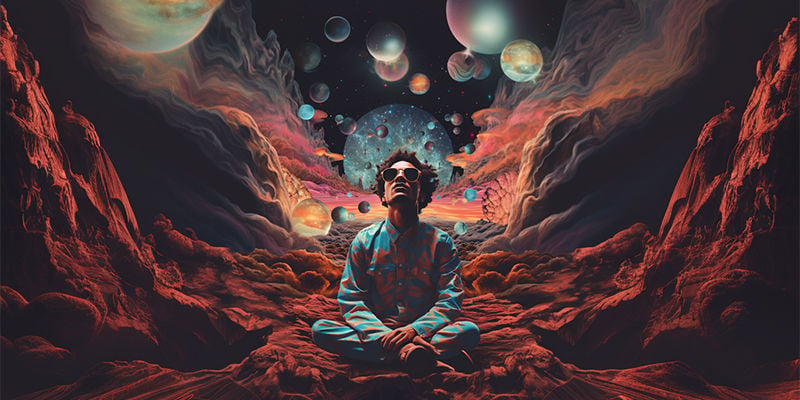
What Is Consensus Reality?
Though reality might seem easily accessible, the closest we can get to defining it comes from consensus. Understanding what people mean when they use the term "reality" can be very illuminating. Find out all about consensus reality, and how drugs could influence our perceptions of what's truly "real".
Reality is a mysterious place. We all live within it, but have no idea what it is. And when we take drugs, we can seriously displace strongly held conceptions of reality, and raise far more questions than answers.
The term “consensus reality” is used to refer to the one agreed upon, sober experience that most human beings appear to share. But do we really share it, and how real is this consensus reality?
In this article, we explore different approaches to consensus reality, and look at what drugs might be able to tell us about it.
What does consensus reality mean?

Consensus reality is a tricky term to pin down. Generally, though, we can offer two potential definitions depending on the form of consensus we are talking about.
Realist reality
First, the original meaning of the term relates to the world-as-it-is-in-itself—what really exists independent of experience. Most assume that there is a world beyond the mind, but most would also accept that each mind experiences that world a little, and sometimes very, differently from others. So how do we decide which properties of the world really exist, and which are subjective and mind-dependent?
One of the most obvious ways to attempt to do this is by reaching a consensus. What can most people agree upon? We agree that water is a liquid because everyone experiences water as having the properties of a liquid—and it is scientifically testable as being a liquid. We do not, however, agree that wood is a liquid, as most people experience it having the properties of a solid.
Now, we could change our use of language so that liquid meant solid and vice versa, but we don’t assume that this would change the nature of reality (Miller, 2021). We would still experience water and wood as having the same properties they have always had.
By reaching a consensus, we can make inferences about the true nature of the mind-independent reality.
Social reality
More recently, a sociological approach to consensus reality has been proposed. This posits that there are agreed upon social realities in which we exist—that through consensus, we reach largely understood “truths”.
One example could be the comparison of religion and science. A few hundred years ago in Europe, it was generally accepted that the Christian God created the universe, and that a moral code based on this God was a universal truth. These days, people tend to hold a more scientific world view, and many reject a theistic one.
These can both be thought of as social realities that are formed by consensus, or general agreement. In these cases, we can assume that no properties of the world-as-it-is-in-itself change when society shifts its views about the world. Nevertheless, the practical reality in which human beings live can change dramatically.
So, relating to society, consensus reality refers to agreed upon norms, ideologies, belief systems, and behaviours (Elder-Vass, 2013). These can change, and don’t necessarily relate to any one true reality. In fact, socially constructed realities can coexist, both across the world and even within nations, cities, and small social groups.
Take two opposing political parties. Within each of these groups, there will be consensus about how a country could best be managed, what laws should be in place, what fairness means, and so on. Neither one of these realities is any more or less “true” than the other.
What is subjectivity?

Reality is often thought to refer to something objective, meaning something that is true in itself and isn’t dependent on being viewed in a certain way. In contrast to this is subjectivity, which means something that is dependent on the mind experiencing it—or rather, is a mind experiencing something.
So, for instance, the idea that water is a liquid is generally agreed upon and is assumed to be an objective property of the world. That water is a delicious drink, on the other hand, would be subjective. As there is no universal (or near-universal) consensus about how tasty water is, then deliciousness is not taken to be a property that belongs to water, but rather an experience someone has of drinking water.
To reverse it, people can experience that water is liquid, but it is generally assumed that the liquid nature of water belongs to the water itself, not the experience.
Is consensus reality the objective reality?

All this leads to the question: Is consensus reality (defined in the realist sense) the world as it is objectively?
Well, sadly, there is no consensus about that!
Broadly—disregarding for a moment the sociological approach—there are two main ways to understand consensus reality.
The materialist approach
Materialists believe that the world is real and there. While they may believe that the mind affects the ways in which we see the world, they also generally assume that the physical world as we experience it is a close representation of true reality. This becomes even more true when we consider evidence such as scientific measurements and mathematics.
Simply put, materialists believe that consensus reality is the objective reality—in relation to the material world. At the very least, a materialist will believe that objective reality could potentially be determined through scientific consensus, even if they don’t believe it is currently known.
The idealist approach
Idealists, on the other hand, hold that the world is a product of the mind. Some idealists will say that there is an external, objective reality, but that we can’t know it; others might even deny that. These idealists hold that the (knowable) universe is purely a mental phenomenon (Mellor, 2012). For the purposes of this article, we’ll assume an external world does exist.
The idealist approach says that we cannot know the world-as-it-is-in-itself. All we can know and reach consensus about are our experiences of it. For the idealist, it is probable that each individual experiences their own unique reality. While this reality may be similar to that of others, it will also be profoundly different in some ways.
For instance, take the water example again. Some people love water, while others hate it. Given this, how can we assume what water is “really” like? Although we might be able to agree that water is liquid, we can’t agree on all of water’s characteristics; therefore, how can we claim that when people talk about water that they are talking about the same thing, when individuals have distinct conceptions of it?
This example may seem fairly weak, but this approach has potentially profound consequences on our understanding of reality.
What this means is that even if there is an external, objective reality, it is inherently unknowable to us. As each of us has our own reality, how can we really speculate about what an objective one might look like? It’s not even possible to conceive of the world not being experienced, as it still has colour, sound, and all of the other properties of a world being experienced. So idealists would say that each person lives in their own individual reality, even if this is somehow formed by an external one.
Can the two coexist?
To an extent, it is possible to hold both views of reality—most people probably do inherently. We can assume that we can speculate about the true nature of reality, and that we can explore it using mathematics and the scientific method, while also recognising that each of us has a subjective and individual experience of this reality.
The main difference comes down to whether a person believes that we can truly know about an external reality.
What are the social implications?

Socially, concepts of consensus reality have big implications. Most practically, this comes down to rights and morality.
Killing is wrong. Inequality is bad. People should be able to love whoever they want.
For many people, these are firm beliefs that form their overall conception of how society should be structured. Moreover, people will assume that these are absolute truths, rather than just subjective beliefs. But is that true? Are they not just a consensus that is subject to change?
100 years ago, inequality was thought to be totally fair. Were people back then just objectively wrong, or did they just live in a different consensus reality? And what about the people who believe otherwise today—are they objectively wrong?
Answering these questions is incredibly difficult, and far too big a task for this article. However, it’s worth highlighting how powerful social consensus really is. It can cause revolutions, change entire generations, and ultimately change the world. But, for most of us, what are these beliefs based on besides consensus? And just because there’s consensus regarding beliefs, what value does this have? After all, consensus can readily change.
What can drugs tell us about the nature of reality?

It’s no secret that psychotropic drugs—particularly psychedelics such as magic mushrooms, mescaline cacti, LSD, and DMT—change our perception of reality, but what can this tell us?
We take a drug, chemicals in our brains change, and the world appears different—sometimes unrecognisably different. If the way that we perceive the world is simply a matter of neurotransmitter ratios, then what does this mean for everyday consensus reality? Should we assume that the reality we experience when sober is any more true than the reality we experience on drugs? How do we know if one corresponds more to an outer reality compared to another?
It comes down to the materialist vs idealist debate. A materialist would say that the drugs don’t change the qualities of true reality, and would probably claim that the sober brain is evolved to perceive reality at least fairly clearly. In contrast, they would claim that the realities we experience on drugs are further from the one true reality than those we experience sober.
An idealist, on the other hand, would argue that both realities are equally true/untrue. As all we experience are subjective realities, then the truth of the experience lies in the experience itself, not how it relates to some unknowable, objective reality.
What are the best drugs for shifting your sense of reality?
All psychotropic drugs change our sense of reality in some way or another. However, there are some that are revered specifically for the insight that they give us into the maleable nature of reality. Many of these have been used by various cultures for millenia, and are still well loved today.
If you'd like to step out of consensus reality, consider trying:
- Psilocybe mushrooms
- Mescaline cacti
- Salvia divinorum
- DMT
- LSD
Reality: What’s really there?

Reality! It’s just in front of our eyes, within reach of our ears, and easy to touch. Yet, it’s somehow totally ineffable!
What is reality? How do we define it? How many realities are there? Is it all in our head?
These are all huge questions with profound, myriad, and uncertain answers. While it’s unclear whether consensus reality corresponds to an objective reality, we can be certain that agreeing about the nature of the world we live in certainly has practical applications.
That being said, it’s crucial to understand the social realities in which we live are constructions, and not objective realities. Knowing this gives us the power to see them and influence them; being blind to them means we can get swept away by them.
- Dave Elder-Vass. (2012, April). The Reality of Social Construction - https://www.cambridge.org
- Miller, & Alexander. (2002/07/08). Realism - https://plato.stanford.edu
-
 4 min
2 June 2025
9 (legal) drugs that will induce a psychedelic trip
Interested in discovering which legal substances offer psychedelic-like effects? These 9 options might surprise you with their mind-altering potential—but be warned: not all are safe, and some are...
4 min
2 June 2025
9 (legal) drugs that will induce a psychedelic trip
Interested in discovering which legal substances offer psychedelic-like effects? These 9 options might surprise you with their mind-altering potential—but be warned: not all are safe, and some are...
-
 4 min
1 June 2023
What Are The Best Drugs To Have Sex On?
Sex and drugs have been used together for ages. Some drugs can enhance sex. Others, however, are highly dangerous and should be avoided. We take a look at the good, the bad, and the ugly.
4 min
1 June 2023
What Are The Best Drugs To Have Sex On?
Sex and drugs have been used together for ages. Some drugs can enhance sex. Others, however, are highly dangerous and should be avoided. We take a look at the good, the bad, and the ugly.
-
 9 min
8 April 2022
Top 10 Ways To Get High Without Drugs
Wanna get high—without drugs? In this article, we explore what it means to "get high", and provide 10 natural ways to experience a high without the influence of psychotropic drugs. From lucid...
9 min
8 April 2022
Top 10 Ways To Get High Without Drugs
Wanna get high—without drugs? In this article, we explore what it means to "get high", and provide 10 natural ways to experience a high without the influence of psychotropic drugs. From lucid...
-
 6 min
4 April 2022
How Different Foods Interact With Drugs
You would be forgiven for not thinking much of drinking grapefruit juice before embarking on an acid trip, but it could have surprising effects. The compounds found in certain foods interact with...
6 min
4 April 2022
How Different Foods Interact With Drugs
You would be forgiven for not thinking much of drinking grapefruit juice before embarking on an acid trip, but it could have surprising effects. The compounds found in certain foods interact with...





 United States
United States











